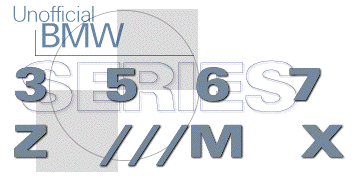|
Ron Stygar Carl Buckland Dale Beuning Forums Help
Date: Sun, 31 Dec 1995 08:59:54 -0500 From: read_at_engr05.comsys.rockwell.com (Pete Read) To: jrallen_at_halcyon.com, kkwollen_at_aol.com Subject: Re: M5 Suspension, Sway Bars
Keith Wollenberg writes: Keith, Thanks for the response. Questions like this certainly make me think things through again and learn some fine points I've missed. I'm sure your memory hasn't failed. Changing sway bars over and over has a way of sticking with you. After pondering this a while, and rereading a number of suspension articles, I found something that may explain your experience. This is from the sway bar section of Puhn's book. "A stiffer front bar prevents excessive positive camber from occuring on the front tires during a turn. This effect is sometimes stronger than the extra weight transfer, and the result is less understeer." So, after double checking, my M5 Suspension post agrees with every article I found. However, I see there are some exceptions to these "rules". In the case of your 1600, a bigger front bar increases the weight transfer that loads the front outside tire causing more understeer. But reduced positive camber change from the bigger bar (less understeer by keeping the outside tire flat on the surface) more than compensates for the understeering tendency from the bigger bar. The net result is less understeer that you experienced.
>From my (limited) experience, M5s react to suspension Suspension Adjustment Table Adjustment More Understeer More Oversteer ---------- --------------- -------------- 1. Front sway bar Thicker/stiffer Thinner/softer 2. Rear sway bar Thinner/softer Thicker/stiffer 3. Front springs Stiffer Softer 4. Rear springs Softer Stiffer 5. Front wheel camber More positive More negative 6. Rear wheel camber More negative More positive 7. Front tire pressure Lower Higher 8. Rear tire pressure Higher Lower Let me try to go through this and see if it makes any sense. The centrifugal force (CF) from cornering is determined by car weight, cornering speed, and turn radius. CF = (Weight lbs x speed^2 mph)/ (14.97 x Radius ft) Total weight transfer is always the same, no matter what size sway bars or springs, as long as excessive roll isn't combined with a high Center of Gravity (CG). Lots of roll and a high CG cause a significant change in weight transfer due to the CG moving outboard. Performance cars, with limited roll and low CG, have negligible weight transfer from the CG moving outboard in a turn. Roll reduction is more important in limiting wheel camber changes than CG movement. So total weight transfer is due to the cornering centrifugal force (CF), CG height, and track width. Total Wt transfer (lateral) = CF x CG Height/Track Width Total cornering weight transfer can be reduced only by lowering the CG height, increasing track width, or reducing the car weight (to reduce CF). It's hard to make a car wider (without flaring the fenders) or lighter, so most people just lower cars a little to reduce weight transfer to the outside tires. Then weight is reduced automatically when the exhaust system is torn-off from grounding! While the total weight transfer can't be easily controlled, the front to rear distribution can be adjusted through sway bars and springs. The end with the most stiffness receives the largest portion of weight transfer. As you can see from the Suspension Adjustment table above, stiffer bars and springs transfer more weight and create more slip (e.g. stiffer front springs and bars cause more understeer). Think about replacing the front springs with solid blocks. If the front end doesn't roll at all, the total weight transfer is handled by the outside front tire. Notice wheel camber though. More positive camber increases understeer. Sway bars reduce positive camber during cornering. In your case #5 (reduction of positive camber) is more important than #1 (weight transfer from stiffer bar). Up to a point, increasing tire pressure reduces slip. Low tire pressure makes a tire more flexible and results in higher slip angles (understeer on front, oversteer on rear). Higher pressure resists distortion more and has smaller slip angles until the upper limit where the tread bulges from too much pressure (tire is no longer flat on surface). That's why I needed six psi difference to reduce understeer at the track (40 front, 34 rear). With the sway bar changes (stiffer rear), I now run equal pressures front and rear. I think BMW's recommended M5 tire pressures of 36 front and 40 rear is intended to add more (safe) understeer. Hope this makes sense, Pete Read |

